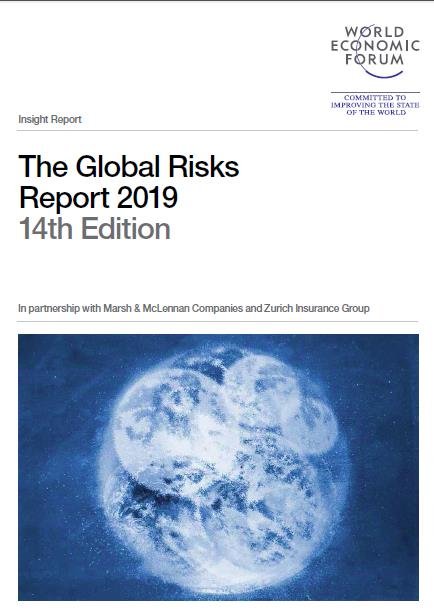- Share this article
- Subscribe to our newsletter
Global Risks Report 2019
The Global Risks Report 2019 was published by the World Economic Forum in January 2019. The report states that the world’s ability to foster collective action in the face of urgent major crises has reached crisis levels, with worsening international relations hindering action across a growing array of serious challenges. Meanwhile, a darkening economic outlook, in part caused by geopolitical tensions, looks set to further reduce the potential for international cooperation in 2019.
The Global Risks Report, which incorporates the results of the annual Global Risks Perception Survey of approximately 1,000 experts and decision-makers, points to a deterioration in economic and geopolitical conditions. Trade disputes worsened rapidly in 2018 and the report warns that growth in 2019 will be held back by continuing geo-economic tensions, with 88 per cent of respondents expecting further erosion of multilateral trading rules and agreements. If economic headwinds pose a threat to international cooperation, efforts will be further disrupted in 2019 by rising geopolitical tensions among major powers, according to the report.
In the survey’s 10-year outlook, cyber risks sustained the jump in prominence they registered in 2018, but environmental risks continue to dominate respondents’ concerns beyond the short term. All five of the environmental risks the report tracks are again in the high-impact, high-likelihood category: biodiversity loss; extreme weather events; failure of climate-change mitigation and adaptation; human-made disasters; and natural disasters.
The human side of global risks
At an individual level, declining psychological and emotional well-being is both a cause and a consequence within the wider global risks landscape, impacting, for example, social cohesion and political cooperation. The Global Risks Report 2019 focuses explicitly on this human side of global risks, looking in particular at the role played by complex global transformations that are under way: societal, technological and work-related. A common theme is that psychological stress relates to a feeling of lack of control in the face of uncertainty.
This year’s report revives the Future Shocks series, which recognises that the growing complexity and interconnectedness of global systems can lead to feedback loops, threshold effects and cascading disruptions. These “what if” scenarios are food for thought as world leaders assess potential shocks that might rapidly and radically disrupt the world. This year’s sudden and dramatic breakdowns include vignettes on the use of weather manipulation to stoke geopolitical tensions, quantum and affective computing, and space debris.
(World Economic Forum/ile)
More information and download report: https://www.weforum.org/reports/the-global-risks-report-2019





Add a comment
Be the First to Comment